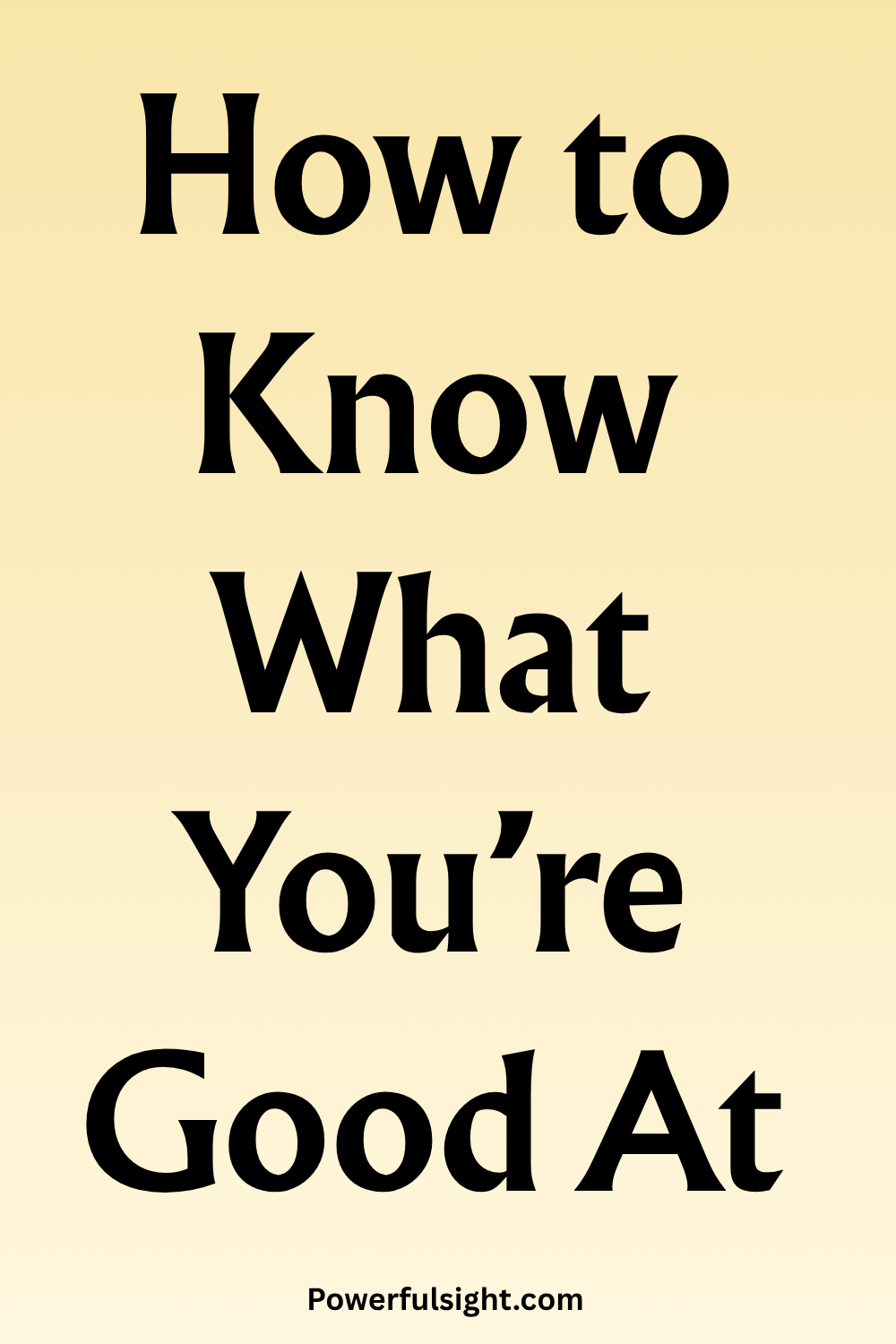It’s a question so simple that, when asked, most people look at you as if you’ve lost your mind: “What am I good at?”
The truly sad thing is that most people never really figure it out. For many, life is just a long, drifting voyage from job to job, hobby to hobby, compare and despair. Meanwhile, quietly in the background, there’s a voice whispering over and over again: What exactly am I supposed to do with my life? And how do I find out?
The thing is, figuring out what you’re good at is less about some dramatic moment of “finding yourself” and more about paying attention. It’s a process of self-discovery that takes years. Curiosity, patience, and brutal self-honesty are your only tools. You don’t wake up one day and have it magically revealed to you; you uncover it bit by bit as you live your life, fail and succeed, and pay attention to how things make you feel.
Let’s go through this step by step together.

How to Know What You’re Good At
1. Observe What Feels Effortless to You
The first step in all this is one of the hardest to accept: when you do things you’re naturally good at, they tend to feel easy.
This is often the opposite of how we’re conditioned to think. We equate effort with worth. If something is easy, we assume it isn’t important. If it doesn’t take hard work to get right, why bother?
But the truth is, some things come naturally to us—like breathing, like walking, like a dog running after a squirrel.
Life is filled with moments that most people struggle with but that, for you, feel instinctual.
Think back to times when you did something and others marveled. They might have thought, “Wow, you make it look so easy,” even if they didn’t say it aloud.
Maybe you explain things clearly. Maybe you’re great at planning events or mediating conflicts. Maybe you design beautiful websites or have a knack for fixing broken things. Maybe you intuitively know where to start when others freeze.
Feeling “effortless” doesn’t mean it takes no work. It means it’s work you can do naturally, without strain. It flows from you almost unconsciously, and other people, who don’t share that same gift, can’t help but notice.
Start there.
Ask yourself:
-
What do I do that people often thank or praise me for?
-
What activities make me lose track of time?
-
What have I done that makes others say, “You make it look so easy”?
-
What have I enjoyed so much that I barely felt like I was working?
Write your answers down. Don’t second-guess them. Patterns will emerge. Look for the themes of what comes easily to you.
Related: 10 Powerful Strategies to Master Your Mind
2. Listen to What People Compliment You On
No one knows you better than you do, but there’s value in what others observe about you.
If you pay attention, there are certain compliments you receive repeatedly: “You’re such a great listener.” “You’re so creative.” “You have a way of explaining things.” “You never get upset.”
We’re often bad at accepting compliments. They make us uncomfortable, so we brush them off. But repeated compliments are signposts—mirrors people hold up so you can see yourself more clearly.
Ask around. “What do you think I’m good at?” You may be surprised by the answers. Often, what others value most in you is something you’ve taken for granted.
Related: How to Become That Girl
3. Think About What You Enjoy (and Why)
Interest is one of the best predictors of skill. We tend to get good at what we enjoy, because enjoyment sustains effort. But the key lies in understanding why you enjoy something.
Enjoyment is rarely simple. Suppose you’re interested in writing. Is it because you love storytelling? Because you like explaining things clearly? Or because writing helps you process your thoughts and emotions?
Each answer reveals something different about you.
Think about all the things you love and ask why you like them. Keep drilling down—don’t stop at the first answer.
For example:
You like movies.
Why?
Because they draw me into another world.
Why?
Because I love feeling lost in something bigger than myself.
Why?
Because I like things that help me forget myself for a while.
See the pattern? By the third “why,” you’ve moved past the surface to something true about you.
This will happen often in this process: the first answer is rarely the real one. Keep digging.
Related: How To Make Your Life A Fairytale
4. Notice What Makes You Curious
Curiosity is a compass. Notice what naturally draws your attention. When you pick up a book or turn on the TV without thinking, what are you drawn to?
Curiosity doesn’t always point directly to your strengths, but it’s rarely random. What your mind lingers on often holds meaning.
Ask yourself:
-
What do I read or watch without being told to?
-
What topics do I research for fun?
-
If I had all the time in the world, what would I study?
-
What would I pick up at a bookstore?
-
What topics catch my attention in conversation?
Your curiosity is a clue. Follow it.
Related: 10 Tips on How to Not Be Materialistic
5. Look Back at What You’ve Always Done Well
Your past holds valuable patterns.
Think back to your childhood, school years, and first jobs. What did you do again and again that came easily?
Did you help people? Tell stories? Solve problems? Take initiative when others hesitated? You were good at it, and others noticed.
The patterns you formed early often echo throughout your life. A child who loves storytelling may become a teacher, actor, or writer. A child who tinkers with machines might become an engineer or designer.
The goal isn’t to limit yourself, but to observe. Past tendencies often foreshadow enduring strengths.
Related: How To Make Everyday Count
6. Try New Things (and Notice How They Make You Feel)
You don’t have to know your strengths in advance. Some can only be discovered by doing.
As you try new things, pay attention not only to what you’re good at but to how you feel.
Do you feel energized or drained? Excited or bored? Engaged or distracted?
Your emotions are a guide. Trial and error teaches more than speculation ever could.
Volunteer for something new. Pick up a hobby. Ask someone to teach you a skill. As you do, notice how your energy shifts. Your reactions are data.
7. Identify Your Learning Style
How do you learn best—by watching, reading, doing, or listening?
We all process information differently, and this can point to where our strengths lie.
If you enjoy explaining concepts, you may have a gift for communication.
If you love reading, you might excel in research, analysis, or writing.
Hands-on learners often thrive in technical or practical fields.
Auditory learners tend to be natural communicators.
Visual learners usually shine in creative and pattern-oriented work.
Notice how you learn. It may reveal how you’re wired to succeed.
8. Pay Attention to What Drains You
Energy can be just as telling as excitement. If something consistently drains you, it’s a signal.
If a task makes you anxious, exhausted, or small, it’s likely not aligned with your strengths. That’s not failure—it’s information.
For example, maybe you can handle people-heavy work but it leaves you drained. That tells you something about your limits and natural rhythm.
Ask yourself:
-
What would exhaust me if I had to do it full-time?
-
What situations make me anxious?
-
What do I consistently avoid?
Notice your energy flow. It tells the truth.
9. Take a Personality or Strength Test
Personality assessments are tools, not verdicts. Instruments like the Myers-Briggs, Enneagram, or CliftonStrengths can help you name patterns you already sense.
They aren’t perfect, but they offer a vocabulary for understanding yourself.
Use them to reflect. Notice what resonates, not what boxes you in. If one sparks something meaningful, explore it further.
10. Look for Where Skill, Passion, and Value Overlap
By now, you’ve gathered clues. You know what interests you, what drains you, what feels natural, and what others appreciate in you.
Now connect the dots.
-
Skill: What you’re good at
-
Passion: What excites or fulfills you
-
Value: What others need or appreciate
Where these three overlap lies your sweet spot.
For instance, if you’re a strong writer (skill), love helping others understand (passion), and people consistently thank you for it (value), you’re likely meant to work in teaching, writing, or content creation.
If the pieces don’t fit yet, don’t worry. Keep watching. It takes time for clarity to form.
11. Accept That Your Strengths Change
If you’re a parent, you know the joy of watching a child’s firsts—their first steps, first words, first day of school. As adults, our own growth is harder to see. Yet it’s there, woven through the quiet moments of our lives.
We are not static beings. Our skills evolve. Passions fade and resurface. Values shift.
Accept that your strengths will change. The best abilities are those that grow with you. You won’t uncover one eternal truth about yourself, but many truths unfolding over time.
12. Be Honest About What You Value
This is perhaps the hardest step because it requires honesty with yourself.
You may have talents others admire, but do you value them? Does the work feel meaningful to you?
Not everything has to serve a grand purpose. Some things you’re good at may exist simply because you enjoy them—and that’s enough.
What matters is alignment. It doesn’t have to change the world, but it should make sense to you.
Final Words
Discovering what you’re good at isn’t a single moment of revelation. It’s a lifelong process of observation, curiosity, and honesty.
You don’t have to look far. Your strengths are already within you, waiting to be noticed. Watch yourself closely. Listen to what others say. Reflect on what energizes and fulfills you.
You’ll find it not in one epiphany, but in a lifetime of small, consistent moments pointing toward something true about who you are.
Save pin for later.

